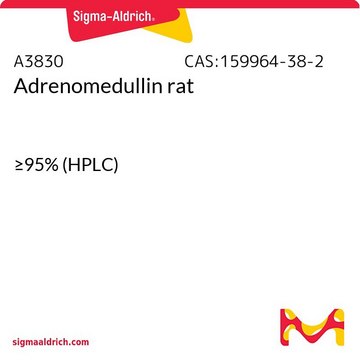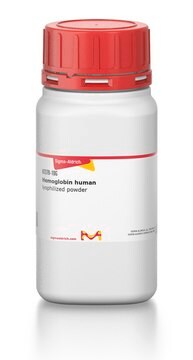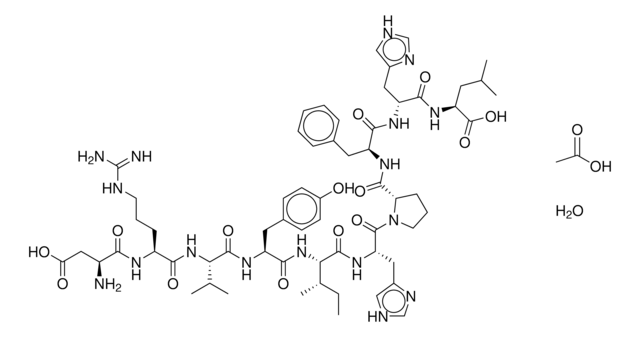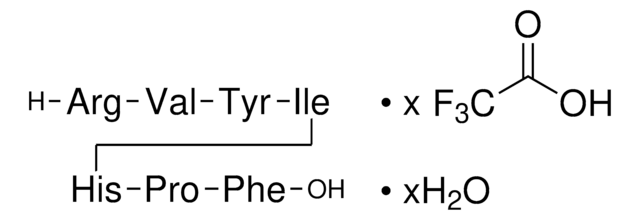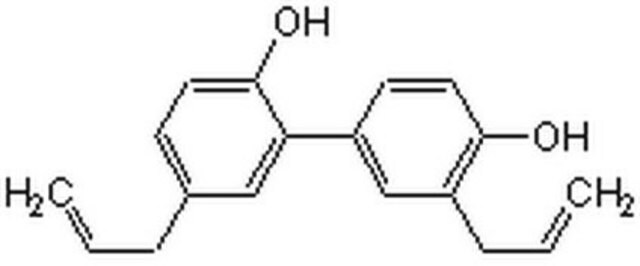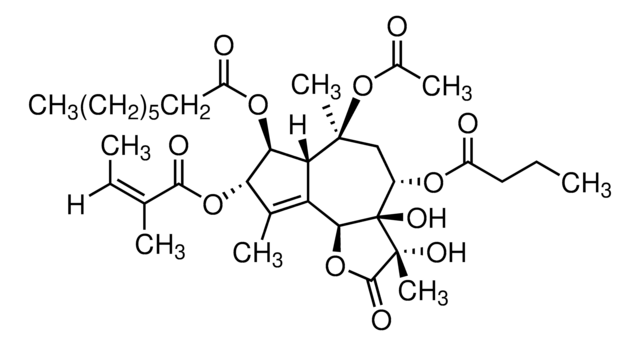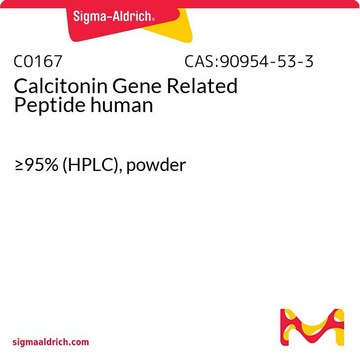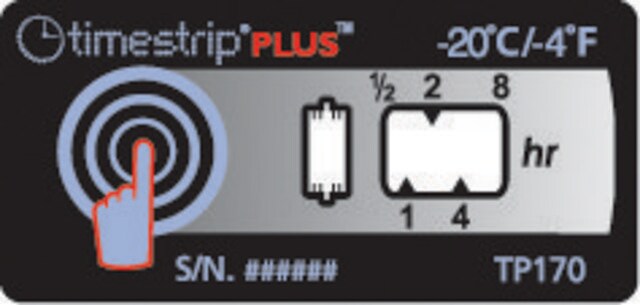A3832
Adrenomedullin Fragment 22-52 human
≥97% (HPLC)
Iniciar sesiónpara Ver la Fijación de precios por contrato y de la organización
About This Item
Fórmula empírica (notación de Hill):
C159H252N46O48
Número de CAS:
Peso molecular:
3575.98
Número MDL:
Código UNSPSC:
12352209
NACRES:
NA.26
Productos recomendados
Amino Acid Sequence
Thr-Val-Gln-Lys-Leu-Ala-His-Gln-Ile-Tyr-Gln-Phe-Thr-Asp-Lys-Asp-Lys-Asp-Asn-Val-Ala-Pro-Arg-Ser-Lys-Ile-Ser-Pro-Gln-Gly-Tyr-NH2
Acciones bioquímicas o fisiológicas
Adrenomedullin Fragment 22-52 [ADM22-52] is used as an adrenomedullin (ADM) receptor antagonist to study the functions and mechanism of action of ADM signaling. ADM(22-52) is used to differentiate adrenomedullin binding sites in various cells and tissues.
Código de clase de almacenamiento
11 - Combustible Solids
Clase de riesgo para el agua (WGK)
WGK 3
Punto de inflamabilidad (°F)
Not applicable
Punto de inflamabilidad (°C)
Not applicable
Equipo de protección personal
Eyeshields, Gloves, type N95 (US)
Elija entre una de las versiones más recientes:
Certificados de análisis (COA)
Lot/Batch Number
¿No ve la versión correcta?
Si necesita una versión concreta, puede buscar un certificado específico por el número de lote.
¿Ya tiene este producto?
Encuentre la documentación para los productos que ha comprado recientemente en la Biblioteca de documentos.
Agnieszka Ziolkowska et al.
International journal of molecular medicine, 11(5), 613-615 (2003-04-10)
Adrenomedullin (ADM) and its receptors are expressed in the adrenal cortex, where ADM is currently known to inhibit agonist-stimulated aldosterone secretion from zona glomerulosa (ZG), without affecting either basal aldosterone release or the secretory activity of zona fasciculata-reticularis (ZF/R) cells.
Takahisa Ishikawa et al.
Oncogene, 22(8), 1238-1242 (2003-02-28)
Since it is reported that adrenomedullin (AM) upregulated by hypoxia inhibits hypoxic cell death, we examined the effects of AM antagonist (AM C-terminal fragment; AM(22-52)) on the growth of pancreatic cancer cells. We, for the first time, demonstrated that AM
Christian Juaneda et al.
European journal of pharmacology, 474(2-3), 165-174 (2003-08-19)
The existence of specific adrenomedullin receptor binding sites was investigated using the agonist peptide fragment [125I]human adrenomedullin-(13-52) in rat brain, lung and vas deferens homogenates. Saturation-binding experiments suggest that [125I]human adrenomedullin-(13-52) binds to an apparent single population of sites with
Jing Hui Yang et al.
Regulatory peptides, 158(1-3), 19-25 (2009-06-16)
Intermedin (IMD) is a novel peptide related to calcitonin gene-related peptide (CGRP) and adrenomedullin (ADM). Proteolytic processing of a larger precursor of IMD yields a biologically active C-terminal fragment IMD(1-53). We aimed to observe the cardioprotective antifibrotic effects of IMD(1-53)
Benjamin Uzan et al.
Journal of cellular physiology, 215(1), 122-128 (2007-10-18)
Adrenomedullin (ADM) has been shown to mediate multifunctional responses in cell culture and animal system such as regulation of growth and apoptosis. ADM stimulates the proliferation of osteoblasts in vitro and promotes bone growth in vivo. The ability of ADM
Nuestro equipo de científicos tiene experiencia en todas las áreas de investigación: Ciencias de la vida, Ciencia de los materiales, Síntesis química, Cromatografía, Analítica y muchas otras.
Póngase en contacto con el Servicio técnico
